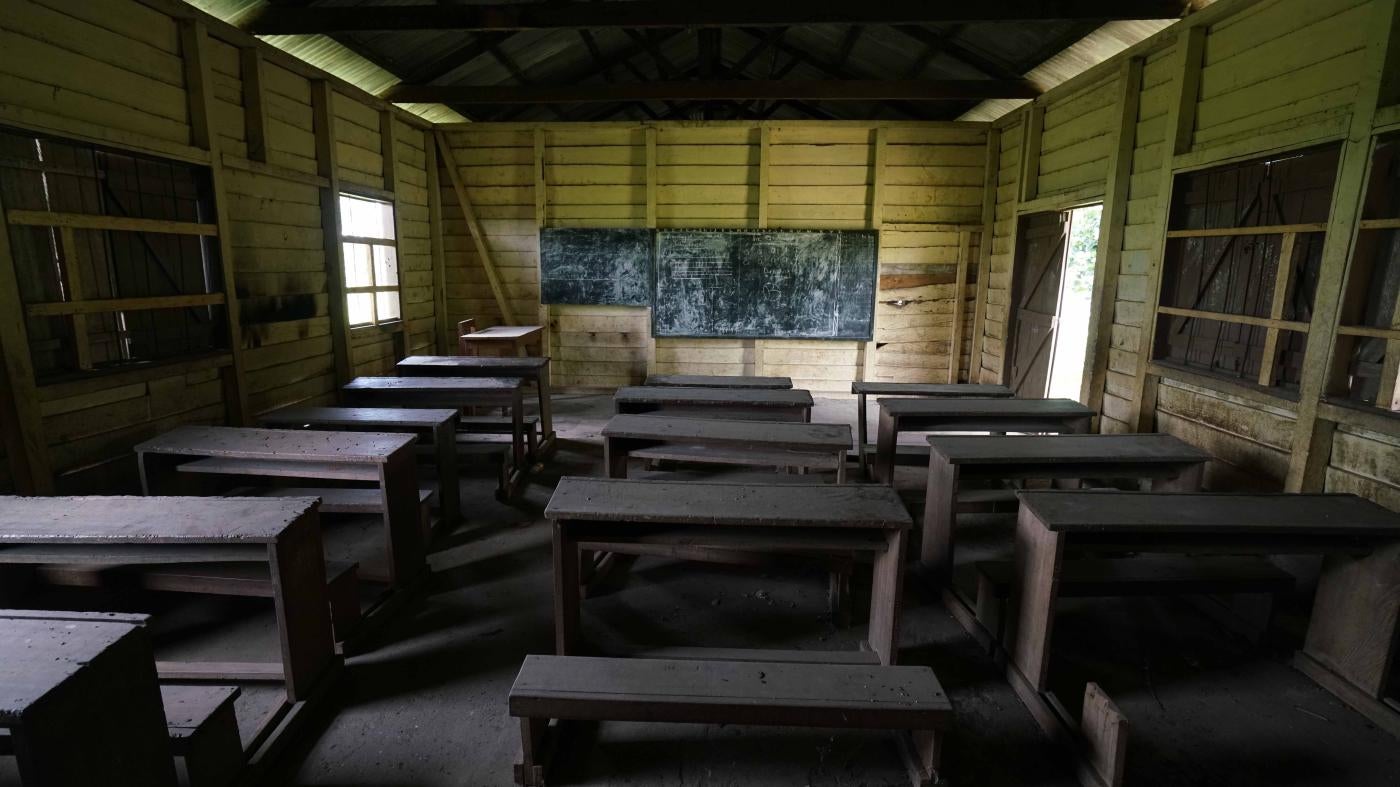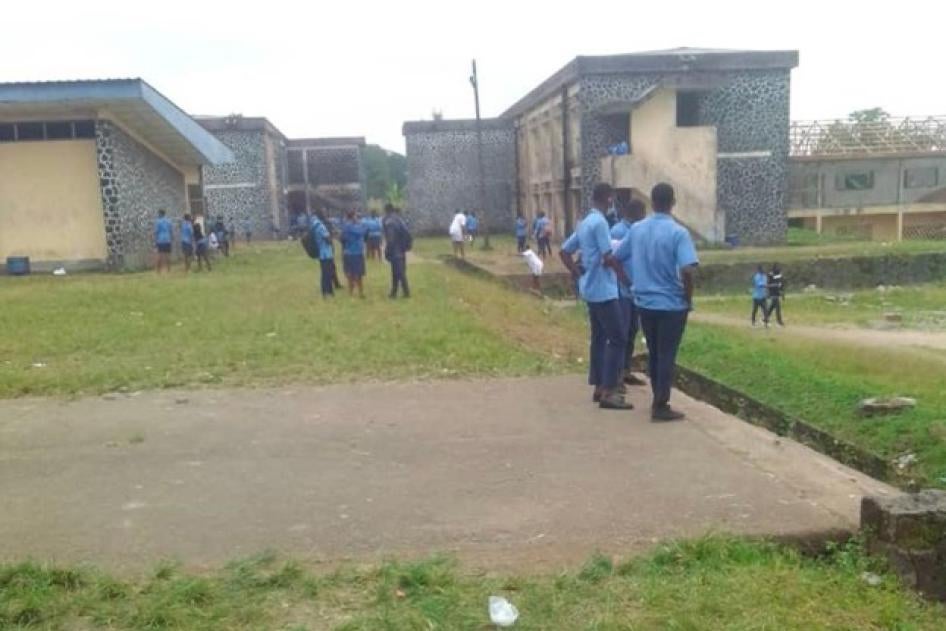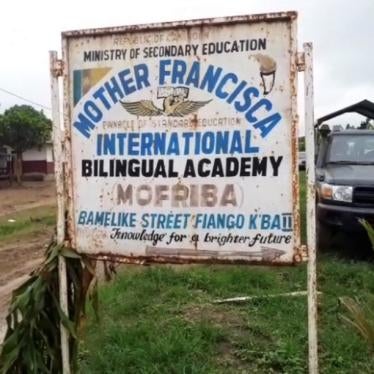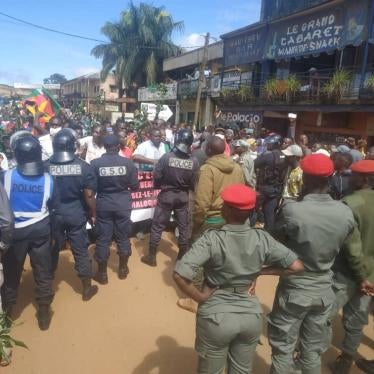Today, she knows of numerous colleagues who, like herself, have been threatened or attacked for their dedication to their jobs and their belief that children have a right to education.
Since 2017, armed groups in Cameroon’s English-speaking regions have been seeking independence from the majority French-speaking rest of the country. In their campaign, separatist fighters, locally known as “amba boys,” have made education a battleground. Believing that the central government is trying to marginalize and assimilate their Anglophone education system, they target schools, kill, kidnap, assault, and threaten students, teachers, and other education professionals for not complying with their demands to boycott school. Across the English-speaking western regions, schools have been forced to close, thousands of teachers have abandoned their jobs or fled, and hundreds of students have been abducted. The attacks, a new Human Rights Watch report finds, have traumatized teachers and pupils alike, intimidated parents into keeping their children out of school, and deprived an estimated 700,000 students of their education.
The current crisis began in late 2016, when central government troops violently suppressed Anglophone teachers, lawyers, and other people peacefully protesting what they perceived were government attempts to assimilate Anglophone courts and schools into the Francophone system. A year later, when security forces again violently cracked down on peaceful gatherings to celebrate the symbolic independence of “Ambazonia,” the name given by Anglophone secessionists to their self-proclaimed independent state made of the North-West and South-West regions, the crisis came to a head. Since then, the fronts between Cameroon’s Anglophone population and the country’s Francophone-dominated government have hardened.
As a history teacher, Juliana well knows that the roots of this crisis go much further back in time. For decades Anglophone Cameroonians have felt marginalized and discriminated against. Juliana, although English speaking, finds herself invariably addressed in French when dealing with public officials; her students struggle to find jobs in the country’s majority Francophone regions. “Our culture, language and identity have been assimilated [into the Francophone system],” she says. “It’s a long-term problem that dates back to independence.”
After World War I, Kamerun, the once-German colony, had been divided into French and British mandates. With independence in 1961, Cameroon became a Federal Republic until 1972, when a unitary government was adopted. Since then, calls by Anglophone groups for a return to a two-state federal system as a way to preserve their own culture, language, and judicial and education systems have not been addressed by the central government. As a result, demands for secession have grown louder and moderate voices increasingly sidelined, while armed separatists have gained support and influence.
Although Juliana didn’t take to the streets in 2016, she sympathizes with those who did. She feels strongly that everybody, including teachers, should have the right to express their grievances peacefully, and that the government’s brutal response was unjustified. What she does not agree with, however, are separatists’ attacks on education. “It is deplorable to see the amba boys acting this way,” she says. “I am ashamed. I cannot understand how you can target children to achieve your political gains.”
Every time another school in the surrounding countryside is abandoned, destroyed, or set ablaze, the size of her classroom swells further. With rural families fleeing to the relative safety of Buea, the number of students her school has had to absorb has doubled. Teaching is becoming increasingly difficult, with teachers, desks, and education materials in short supply. There were times, Juliana says, where six pupils had to share a small bench.
Not only has the government offered very little support to deal with the steady influx of fleeing students, but it has also failed to provide psychological assistance to help them deal with their distress. Some of her students, says Juliana, are so traumatized that every time she raises her voice, they burst into tears. Many don’t know where their parents are or if they are still alive, even as they themselves survived attacks by soldiers or separatist fighters on their villages, fleeing to the bush where they took refuge for weeks, sometimes months. Most will take a long time to heal, fears Juliana, especially those whose parents were killed in front of their eyes. “Those horrible scenes are burnt into their minds,” she says. “You have to listen to their pains and be understanding, even if their behavior is problematic at times.”
Juliana, who has taken two displaced children into her household, which already holds three of her own children and four of her stepchildren, sees trauma manifest daily even in the safety of her own home. The 11-year-old girl she is sheltering barely escaped a military operation during which government forces torched her village and is haunted by not knowing if her parents are still alive. And the 6-year-old boy, whom she picked up from the street, cries every time he is asked about his mom and dad. Knowing that routines help with healing, Juliana made sure that the two were given a place at her school. “They like studying,” she says. “And it keeps their minds occupied.”
She worries about their safety, however. The school, being in an urban area, is heavily guarded by security forces. While she is aware that there are teachers and students who feel uneasy about the deployment of security forces in or outside schools, as their presence might increase the risk of being targeted by armed separatists, she considers school basically the only place that feels safe these days. What she knows is not safe, however, is the way to and from school. With amba boys roaming around the outskirts of town, most students no longer wear school uniforms on their way to and from school, and many even leave their books and notebooks behind or hide them in shopping bags for fear of being spotted and stopped – or even abducted – by separatist fighters, which has happened to many school-going children since the crisis began.
Despite being acutely aware of the dangers lurking outside the school gates, Juliana was not prepared when danger arrived on her doorstep in the form of heavily armed amba boys.
They turned up from nowhere. It was on a Thursday, three days after Juliana had been asked to come to school to catch up some classes. She had gone to school that Monday despite her fears, as Mondays had been declared “ghost town” days (stay-at-home days) by the separatists. Nobody is to work, go to school, or go out on a Monday. But because Juliana teaches in a government school whose policy is to defy separatist demands and ignore the boycott, she felt “under pressure.” The events that followed cost her cats their lives and left her and her children terrified.
“They came by motorbike,” she recalls. “There were three of them, shabbily dressed and armed with guns and machetes.” Forcing their way into her home, they warned her never to teach on a Monday again. Then, presumably as part of their warning, they shot her cats – in front of the children. “The children were screaming,” Juliana remembers. “It was frightening.” She has not been able to shake off the memory of the intruders’ voices and has asked the school to never call on her on a Monday again.
More and more of her colleagues have come under threat recently. Some have been visited and intimidated by separatist fighters at home, others have received anonymous warnings to halt teaching or have been stopped on their way to or from school. The news coming from the countryside is not reassuring, either. In September, 15 soldiers and several civilians were killed in a clash between separatist fighters and security forces in the North-West region. “We don’t just need safe schools,” says Juliana. “We need safe cities and neighborhoods.”
So far, however, the Cameroonian government has not done enough to ensure the safety of teachers and students outside of schools. Attacks by both separatist fighters and the security forces against civilians continue, fueling further violence. And a national dialogue, held from September 30 to October 4, 2019, which resulted in a special status for the North-West and the South-West Anglophone regions, has been boycotted by major separatist groups and failed to address the multiple human rights violations committed by separatists and security forces alike.
What keeps Juliana going, despite the threats and acute dangers, is her students’ eagerness to learn. “They grew up with the idea that education is important,” she explains. Unless peace is restored, however, she fails to see how children can safely return to classes. And she fears that those traumatized kids she sees each day in her overcrowded classrooms “won’t be able to overcome the damages caused by this crisis anytime soon.” Yet, still she takes the dangerous route to school every Tuesday to Friday to return to the classroom, because she firmly believes that every child deserves a future and an education.
This piece is based on interviews with and by Human Rights Watch senior west Africa and Cameroon researcher Ilaria Allegrozzi.





